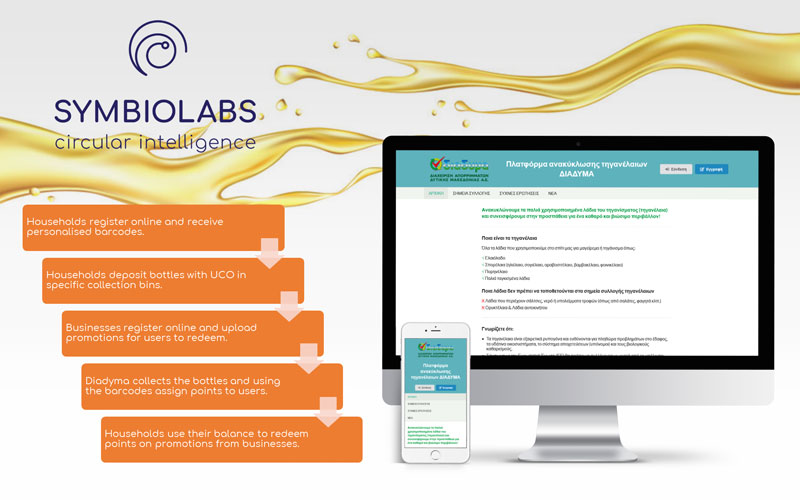by Thanasis Gentimis, Theodore Chatzidimitriou and Antonis Kokossis (SymbioLabs)
A reward scheme operated through a digital platform is encouraging consumers to recycle used cooking oil in West Macedonia, Greece. Cooking oil bottles have personalised barcodes, which, upon return of the bottles, enable the user to collect points that can be redeemed on benefits and discounts in local businesses.
“Circular economy” is the economic model that aims to retain the highest value and utility of products, components and materials at all times, based on sharing, reusing, repairing and recycling. In practice, this means minimising waste and encouraging waste valorisation. Circularity can deliver substantial material savings throughout value chains and production processes, and can unlock economic opportunities while respecting the environment and the finite nature of natural resources.
Used cooking oil (UCO) is edible oil of vegetable or animal origin that has been used to cook food to the point at which the oil is no longer fit for that purpose. Two are the main sources of UCO: Commercial UCO from hotels, restaurants, and caterers (HORECA) and domestic UCO from households. Accurate estimates of global UCO production are unavailable because this data is not recorded, and estimating UCO production is very difficult. In Europe, recent estimates suggest that 1.66 Mt of UCO are available: 0.854 Mt from the household sector and 0.806 Mt from the commercial sector [1]. Commercial UCO has been actively collected in many European countries, initially to serve the needs of the animal feed market. In 2002 the introduction of regulations regarding the usage of animal by-products banned the use of UCO as animal feed in the EU. However, the rapid expansion in the biofuel industry, led to an increased demand for this feedstock.
UCO and other edible oils and fats originating from households are now mostly disposed of together with municipal waste or simply poured into drainage. These actions pose severe environmental risks. When UCO is poured down the drain, it hardens and infiltrates into local sewer, water and waste management facilities, which are not equipped to process fats, oils and grease (FOG). The environmental costs of improper oil disposal include:
- Sewer blockage from solidified FOG within pipes,
- Detrimental impacts on the health of area wildlife and their habitats,
- Overflow of unsanitary bacteria into water lines, soil and buildings,
- Fire hazards in households and infrastructure.
While the recycling of UCO has been required for food industry companies in most of Europe, such recycling on a household level is still not gaining traction, even though it represents a significant part of the overall production. This indicates that domestic UCO is a relatively untapped market, mainly due to the logistics involved in collecting small amounts of UCO from a very large number of households. Out of the estimated 854,000 tons of domestic UCO produced in Europe, only about 48,000 tons are collected (5.6%), with collection being quite fragmented [2].
The success of UCO collection initiatives strongly depends on the participation of individuals, and the most important issue is probably to motivate citizens to recycle their used oil instead of simply disposing it with other municipal solid waste or down the kitchen sink. On the other hand, the major technical challenge of recycling household UCO is its collection, owing mainly to the high logistics costs of such a process. Efforts for household UCO recycling are associated with high CAPEX (special collection bins) and OPEX (logistics).
Such operations can be profitable, but only if there is sufficient UCO recycled – which means sufficient citizens participating. The key success factors for a sustainable system have been recorded, and the most crucial are:
- motivation of citizens through a “citizen-friendly” UCO disposal scheme,
- a focus on public awareness with regular, targeted communication activities,
- support from local administrations, waste management companies and other stakeholders.
Reward schemes have been implemented in European cities to increase citizen participation in better waste management practices. This approach has proven to be very efficient, as rewards can motivate citizens to be more proactive and diligent in recycling. In this respect, SymbioLabs [L1] has partnered with Diadyma S.A. [L2] to apply best practices and introduce a reward scheme designed specifically to facilitate the collection of UCO from households.

Figure 1: A smart digital platform for collecting used cooking oil from households in West Macedonia, Greece.
SymbioLabs developed a digital platform to manage the collection of household UCO with a two-fold aim: (i) to improve the monitoring of recycling rates in specific municipalities, and (ii) to reward citizens who participate in proportion to their contribution of UCO. Diadyma, the official body of waste management for the Region of Waste Macedonia, consisting of 13 municipalities, will deploy the reward scheme using the digital platform, with the aim of it being adopted by 10,000 households in the region.
The platform is simple to use. When they register, users receive personalised barcodes that must be applied to the bottle before depositing it in one of the specific UCO collection bins. When the bottles are collected by Diadyma for further processing and valorisation, the operator scans the barcode and then reward points are assigned to each user depending on the quantity of UCO in the bottle. The more the collected UCO is, the more points are assigned. The digital platform is fully interoperable with other initiatives of Diadyma, such as promoting reuse and repair. As a result, citizens can combine points earned from recycling UCO with points earned from participating in reuse activities then redeem them on benefits or discounts in local businesses or for entertainment (for example, theatre, cinema or concert tickets).
Links:
[L1] https://www.symbiolabs.gr/
[L2] https://www.diadyma.gr/
References:
[1] M.I. Loizides, et al.: “Circular Bioeconomy in Action: Collection and Recycling of Domestic Used Cooking Oil through a Social, Reverse Logistics System”, Recycling 2019
[2] Z. Gkouskos, et al.: “From Used Cooking Oil to biodiesel”, Full Supply Chain demonstration, 2018.
Please contact:
Thanasis Gentimis
SymbioLabs, Greece










